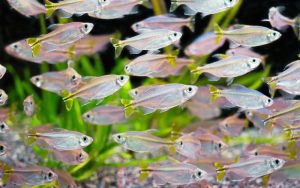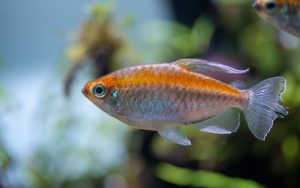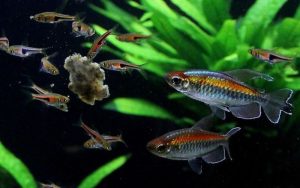Betta fish, also known as Siamese fighter fish, are popular fish pets known for their spirited colors and unique personalities. However, bettas require proper care and attention, including a well-balanced diet like any other pet. Overfeed betta fish might lead to various health issues, and owners need to recognize the symptoms and take quick action to remedy the situation.
In this article, we will discuss the consequences of overfeeding a betta fish, how to recognize the symptoms of betta fish overfed, and quick fixes to help your fish recover.
Betta fish overfeeding can lead to health problems for betta fish, including obesity, bloating, fin rot, and even death if not addressed promptly.
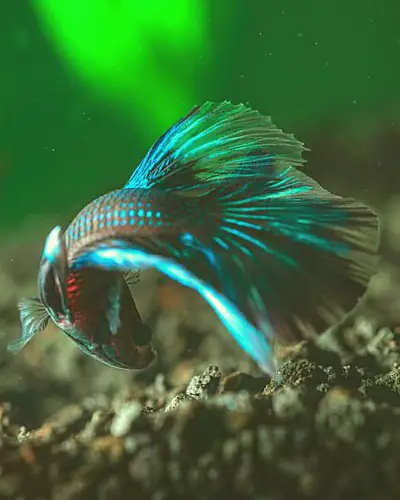
Betta fish owners need to identify the signs of overfeeding and know how to adjust their feeding habits to prevent these issues properly. By being vigilant and taking the necessary steps, you can ensure the health and well-being of your beloved betta fish.
Table of Contents
ToggleCan You Overfeed Betta Fish?
Yes, you can overfeed betta fish. It’s quite a common problem among betta owners. While they may appear enthusiastic eaters, giving them too much food can seriously affect their health and environmental quality.
Here’s why you should be mindful of overfeeding your Betta:
Health issues for the fish:
- Bloating and digestive problems: This is the most immediate and visible sign of overfeeding. You’ll notice their belly becoming noticeably swollen and round. This can lead to constipation, swim bladder issues, and difficulty swimming.
- Reduced lifespan: Chronic overfeeding can stress their metabolism and organs, leading to a shorter lifespan and increased disease susceptibility.
- Fatty liver disease: This severe condition is linked to a diet high in fats and proteins, which can be a problem with overfeeding pellets or freeze-dried foods.
Impact on the water quality:
- Ammonia spike: Uneaten food decomposes and releases ammonia, which is toxic to fish. Overfeeding can quickly overload the biological filtration system in your tank and lead to ammonia spikes.
- Poor water parameters: Excess betta food also contributes to increased nitrate and nitrite levels, further deteriorating the water quality and putting additional stress on your fish.
You can keep your Betta healthy and happy for years by practicing responsible feeding habits. Remember, it’s always better to err on the side of underfeeding than overfeeding.
How Much Should You Feed a Betta?
The amount you should feed your betta fish depends on a few factors, including age, activity level, and water temperature. However, as a general rule, you should feed your Betta 2-4 pellets twice daily or the equivalent amount of flakes or frozen food.
Here are some things to keep in mind when feeding your fish:
- Age: Younger bettas need less food than older bettas.
- Activity level: More active bettas need more food than less active bettas.
- Water temperature: Warmer water temperatures increase a betta’s metabolism, so they must eat more.
- Food type: Pellets are the most concentrated food, so you will need to feed less than flakes or frozen food.
It is always better to err on the side of underfeeding your Betta than overfeeding it. Overfeeding can lead to obesity, swim bladder problems, and other health issues.
How Often Do You Feed a Betta Fish?
Feeding a betta fish can be tricky, as it is essential to provide them appropriately. Typically, bettas should be fed once or twice daily. Sticking to a consistent feeding schedule and offering only small amounts of food at a time is best.
Overfeeding can lead to health issues for the betta fish, such as swim bladder disorder and bloating. It is also important to note that betta fish should have a “fasting” day once a week to help with digestion and prevent obesity.
When feeding your betta fish, it is best to use high-quality betta pellets or flakes and occasional treats like frozen or live bloodworms. By following these expert guidelines, you might ensure that your fish stays healthy and happy.
Factors to Consider on How Often and How Much You Feed a Betta Fish
When feeding your Betta fish, finding the right balance is crucial for their health and happiness. Here are some key factors to consider:
Frequency:
- Ideal: Most experts recommend feeding Bettas twice daily, with at least 6-8 hours between meals. This mimics their natural foraging behavior in the wild and keeps their metabolism humming.
- Alternatives: Some aquarists feed three to four times a day, offering even smaller portions. This can be especially beneficial for younger Bettas or those in larger tanks with more energy expenditure.
- Fasting: A once-a-week fasting day can help promote digestion and prevent overfeeding.
Quantity:
- General rule: The golden rule is to feed an amount your Betta can consume in two minutes. Overfeeding is a common mistake, leading to bloating, constipation, and water quality issues.
- Portion size: This will depend on the type of food and your Betta’s size. Two to four pellets for adult Bettas are typically a good starting point.
- Visual cues: Observe your Betta’s belly. It should be rounded but not distended after they eat. A bulging belly indicates overfeeding.
Food type:
- Variety is vital: Offer a diet that includes high-quality pellets, freeze-dried or frozen food, and occasional live food treats. This provides complete nutrition and keeps your Betta engaged.
- Pellet quality: Choose pellets formulated explicitly for Bettas, often labeled “mini” or “micro.” Larger pellets can be problematic for them to swallow.
- Live food: Supplementing with live food like brine shrimp or bloodworms can be great for enrichment and exercise but should not be the sole diet.
Remember, it’s always better to slightly underfeed than overfeed your Betta. Start with a conservative amount and slowly adjust as needed. By considering these factors and closely observing your Betta, you can ensure they get the right amount of food for a happy and healthy life.
Consequences of Overfeeding Your Betta Buddy
Overfeeding your betta fish might have serious consequences for its health. Betta fish have small stomachs and can easily become overfed, leading to obesity and various health issues. Overfeeding can also lead to poor water quality in the fish tank, as uneaten food can decompose and create excess waste in the water.
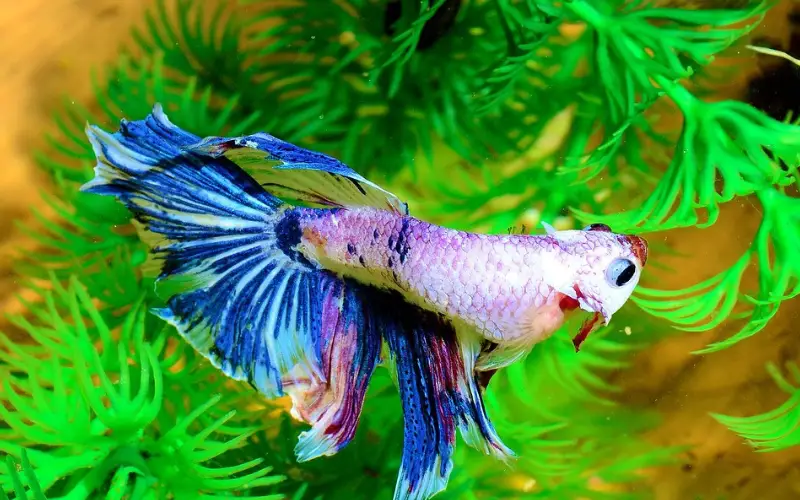
This can result in ammonia and nitrite levels rising, which can harm your Betta’s health. Additionally, overfeeding can lead to digestive problems, such as bloating and constipation, which can be uncomfortable and distressing for your fish.
To avoid these consequences, it’s essential to feed your betta fish appropriately and remove any uneaten food from the tank after feeding. This will help keep your betta buddy healthy and happy for years.
Can Overfeeding Lead To Death in Betta Fish?
Yes, unfortunately, overfeeding can lead to death in betta fish. These beautiful aquatic pets have small stomachs and require surprisingly small food. Exceeding that amount can have severe consequences for their health.
Here’s how overfeeding can harm your Betta:
- Digestive issues: Bettas can’t correctly digest excess food, leading to bloating, constipation, and internal blockages. These conditions can be painful and even fatal.
- Poor water quality: Uneaten food decomposes, pollutes the water, and increases ammonia levels. Ammonia is toxic to fish, stressing them and making them vulnerable to disease.
- Fatty liver disease: Overfeeding high-fat foods can contribute to fatty liver disease, a serious condition that can damage the liver and shorten the lifespan of your Betta.
So, how much should you feed your Betta? A good rule of thumb is to give them two to three pellets, or the equivalent amount of another food, once or twice a day. Observe your Betta after feeding. If Betta’s stomach appears rounded or distended, you’re likely giving them too much.
How Do I Avoid Overfeeding My Betta?
Following a strict feeding schedule is essential to avoid overfeeding your Betta. Only feed your Betta fish a small portion of food once or twice a day, making sure not to exceed the recommended amount.
It’s important to remember that Betta fish have tiny stomachs and can only consume a small amount of food at a time. Additionally, be mindful of how much uneaten food is left in the tank after feeding. If there is still uneaten food after a few minutes, it’s a sign that you have overfed your Betta.
By establishing a feeding routine and being conscientious of how much food your Betta needs, you can help ensure that your Betta stays healthy and happy.
What To Feed My Betta Fish?
Betta fish are beautiful and relatively low-maintenance, but they have specific dietary needs to stay healthy and vibrant. Here’s a rundown of what you can feed your betta fish:
Staple diet:
- High-quality betta pellets: These should be the backbone of your Betta’s diet. Look for pellets formulated explicitly for bettas, as they contain the right balance of nutrients for their needs. Choose shots that sink slowly, as bettas are surface feeders and may not eat sinking pellets readily.
Treats:
- Brine shrimp: Live, frozen, or freeze-dried brine shrimp are a great occasional treat for bettas. They’re high in protein and easy for bettas to eat.
- Bloodworms: Another protein-rich treat can be offered live, frozen, or freeze-dried.
- Daphnia: These tiny crustaceans are another excellent source of protein and variety for your Betta’s diet.
- Mosquito larvae: If you can find them, mosquito larvae are a natural treat that bettas love. Just be sure to rinse them well before feeding.
Things to avoid:
- Flakes: While some betta fish will eat flakes, they’re not as nutritious as pellets and can cause digestive problems.
- Goldfish food: Goldfish are omnivores, while bettas are carnivores. Goldfish food won’t meet your Betta’s nutritional needs.
- Live feeder fish: These can introduce diseases to your Betta’s tank, so it’s best to avoid them.
Ensure you’re feeding your Betta high-quality food.
Feeding your betta high-quality food is essential for its health and overall well-being. Look for betta pellets or flakes specifically formulated for bettas that contain a high protein percentage.
Avoid overfeeding your Betta, and provide a varied diet that includes live or frozen foods such as brine shrimp, bloodworms, or daphnia. A balanced diet will help ensure your Betta receives all the essential nutrients it needs to thrive.
Additionally, be mindful of the expiration dates on the food you feed your fish and avoid using any food past its prime. Providing your Betta with high-quality food can help promote its vibrant colors, robust immune system, and overall health, leading to a happy and thriving fish for years to come.
Feeding your Betta a Pea
Feeding your Betta a pea can be a helpful way to alleviate constipation. Bettas can sometimes have trouble passing food through their digestive system, causing them to become bloated or constipated.
To help with this issue, you can offer your Betta a cooked and peeled pea as a natural remedy. To prepare the pea, boil it until soft and peel off the skin.
Next, cut it into small pieces and offer it to your Betta as a treat. The pea fiber can help move blockages through the digestive system, providing relief for your Betta.
However, it’s important to remember that a pea should only be offered as a temporary solution, not a regular part of your Betta’s diet. Additionally, monitor your Betta’s behavior and consider adjusting its diet if constipation becomes recurring.
Size of Your Fish Food
When it comes to feeding your betta fish, the size of their food is crucial. Betta fish have small mouths, so choosing appropriate food for their size is essential.
Look for betta pellets or flakes that are small enough for your fish to easily consume without causing any choking hazards. Overly large food particles can also lead to digestive issues for your Betta.
Choose the smallest size available if you feed your Betta live or frozen food, such as bloodworms or brine shrimp. It’s also crucial to avoid overfeeding your Betta, as this can lead to health problems.
By selecting the right size of food for your betta fish, you can help ensure their nutritional needs are met while promoting their overall health and well-being.
Treating a Fish That Has Symptoms of Overeating (Quick Fixes for an Overeating Betta Fish)
1. Fasting: The simplest and most effective fix is a 24-48 hour fast. Bettas can go this long without food without issue, allowing their digestive system to clear out and recover.
2. Reduce Feeding: After the fast, switch to a smaller food amount. Bettas only need 2-3 pellets twice a day, or the equivalent in bloodworms or other frozen food. Avoid flakes, which can fill the fish without offering much nutritional value.
3. Pea Laxative: For constipation caused by overeating, offer a shelled, frozen pea (cut in half if small) as a one-time laxative. The pea’s fiber will help move things along.
4. Water Changes: Increase water changes to remove excess ammonia and nitrates from food waste. Aim for 25-50% changes every other day for a week.
5. Monitor Water Quality: Regularly check water parameters like temperature, pH, and ammonia. Ensure optimal levels for Bettas (78-80°F, pH 6.8-7.5, 0 ammonia & nitrite). Poor water quality can stress the fish and worsen overeating issues.
Bonus Tips:
- Avoid overfeeding fry/babies, as they can easily overeat as well.
- Use a feeding ring to prevent uneaten food from scattering and polluting the tank.
- Encourage natural foraging with live or frozen foods like brine shrimp or daphnia.
- Consider adding aquarium plants as they absorb nutrients and provide hiding spaces for a less stressful environment.
Remember, consistency is key! Sticking to a proper feeding schedule and maintaining good water quality will help prevent future overeating and keep your Betta healthy and happy.
Disclaimer: These are quick fixes and not a substitute for professional veterinary advice. If your overfed betta fish symptoms persist or worsen, consult an aquatic veterinarian or experienced fishkeeper for further guidance.
Commonly Asked Questions about Preventing Betta Fish Overfeeding for Healthy Aquariums (FAQs)
Why does this happen to Bettas?
Overeating in bettas can happen for various reasons, including stress, boredom, or being offered too much food. Some bettas may also have a higher appetite and be prone to overeating. Overfeeding by the owner can also contribute to this issue, leading to adverse health effects for the fish.
How Does Constipation Turn into Swim Bladder Disease?
Chronic constipation can distend intestines, pressing on the swim bladder and disrupting its buoyancy control, leading to swim bladder disease.
Is it normal for a betta fish to lay on the bottom of the tank?
It’s not unusual for a betta fish to rest on the bottom occasionally, especially near plants or decorations. They may even nap on their side! However, if your Betta seems lazy, isn’t swimming actively, or exhibits other symptoms like clamped fins or loss of appetite, it could indicate underlying health issues like poor water quality, swim bladder disorder, or stress.
What happens if you overfed bettas?
Overfeeding bettas leads to bloating, constipation, ammonia spikes, and reduced activity, harming their health and tank conditions. Fix with fasting, water changes, and feeding less.
Will betta fish stop eating when they are full?
Betta fish may not show obvious signs of fullness like other fish and can overeat. Offer small portions twice daily, about the size of their eye, and remove uneaten food to avoid overfeeding.
How do I stop my betta fish from overfeeding?
To prevent overfeeding your betta fish, provide only small portions of food once or twice a day. Avoid leaving excess food in the tank, as it can lead to water pollution. Monitor your fish’s behavior and adjust feeding accordingly.
How do you treat overfed fish?
To address overfed fish, reduce feeding frequency and amount. Skip feeding for a day or two. Ensure a clean tank and monitor water parameters. Give your betta time to digest.
Why is my fish so bloated and ate too much?
A bloated fish after overeating could be due to overfeeding or a more severe issue. Remember, early intervention is critical! Monitor your fish closely and act quickly if symptoms worsen.
How do you clean uneaten food out of a fish tank?
To clean uneaten food from a fish tank, use a fish net to remove any visible debris. Perform regular water changes and use a siphon to vacuum the gravel, removing any remaining food particles.
What are the symptoms of overfed betta fish?
Symptoms of overfed betta fish may include bloating, constipation, lethargy, loss of appetite, and fin rot. It’s essential to feed bettas in moderation to maintain their health and avoid overfeeding-related issues.
Final Thoughts
In conclusion, it is essential to be mindful of overfeeding betta fish to ensure their health and well-being in the aquarium. Overfeeding can lead to various issues for betta fish, such as obesity, digestive problems, and water quality issues. Betta fish are known to be voracious eaters, so it can be easy to overfeed them unintentionally. Betta fish overfed symptoms may include bloating, constipation, and decreased activity.
Establishing a feeding routine and monitoring the fish’s behavior and physical appearance is crucial to avoid betta fish overfeeding. Carefully portioned meals and incorporating occasional fasting days can help regulate their diet and prevent overfeed betta fish. By maintaining a balanced diet and observing their condition, betta fish can thrive in their aquatic environment and live a healthy, active life.
You might also like
- Can Betta Fish Eat Tropical Flakes! (3 Better Alternatives)
- The Ultimate Betta Fish Vacation Feeder Guide: 5 Winning Tips
- Betta Fish Not Eating and Laying at Bottom: 3 Reasons Solved
- Can a Betta Fish Eat Goldfish Food! (Or Will It Be Harmful?)
- What Can Betta Fish Eat of Human Food? (Bettas Diet List)
- How Often Do You Feed a Betta Fish? & How Much! (Solved)
- Betta Spits Out Food: 3 Common Causes & Quick Solution!
- Bloated Belly Betta Fish: Symptoms, Causes & Quick Fix!
- Betta Fish Feeding on Vacation: (Best Practices & Tips)
- Can Bettas Recognize Their Owners: (The Surprising Bond)
- Betta Fish Is Bloated 101: Common Causes & Effective Treatment


